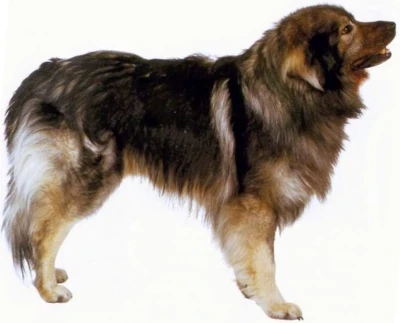
The Karst Shepherd, also known as the Karst Shepherd Dog or Kraški Ovčar, is a herding dog breed originating from the Karst region of Slovenia. This dog has been used for centuries to guard livestock and protect farms. It is known for its endurance, intelligence, and loyalty.
The Karst Shepherd is a medium-sized, well-proportioned, and robust dog. Males typically stand between 57 and 63 cm at the withers, while females stand between 54 and 60 cm. Their weight ranges from 30 to 42 kg for males and from 25 to 37 kg for females. This dog has a muscular body with solid bones, a deep chest, and strong limbs. Its head is proportionate to its body, with a slightly domed skull and a powerful muzzle. The eyes are medium-sized, almond-shaped, and dark brown, expressing a gentle and intelligent look. The ears are medium-sized, triangular, and naturally hang close to the sides of the head.
The coat of the Karst Shepherd is double-layered, with a dense undercoat and a long, thick outer coat. This coat provides excellent protection against harsh weather conditions. The coat color is generally iron gray, with lighter shades on the belly, limbs, and tail. Regular brushing is necessary to keep the coat clean and prevent tangles.
In terms of personality, the Karst Shepherd is known for its balanced, courageous, and loyal temperament. It is very attached to its family and shows great vigilance when it comes to protecting its territory and loved ones. This dog is generally reserved with strangers, but it is affectionate and devoted to its family members. Due to its strong protective instinct, early socialization and consistent training are essential to develop well-balanced and obedient behavior.
The Karst Shepherd is generally a robust breed, but like all dogs, it can be prone to certain health issues. Common health problems include hip dysplasia and some hereditary diseases. A balanced diet, regular veterinary care, and adequate physical activity are essential for maintaining overall health. It is also important to monitor the coat to prevent parasites and infections.

The Karst Shepherd Puppy is a robust and agile dog, ideal for outdoor life and working activities. With a calm yet alert temperament, it is very attached to its family and needs early socialization to adapt well to other animals and children. Intelligent and eager to please, this dog learns quickly and requires consistent training. Its coat, which is usually short and dense, requires little maintenance.
The price of a Karst Shepherd Puppy generally ranges between 700 and 1,500 euros. Puppies from champion bloodlines or reputable breeders can reach higher prices, depending on the quality of the pedigree and health tests. Costs may also fluctuate based on the region and demand.
The Karst Shepherd is an intelligent, loyal, and protective dog that requires firm but kind training. Due to its independent temperament, it is important to establish a trusting relationship while setting clear boundaries from the start.
Early socialization is crucial for this breed. Expose it to different environments, people, and animals from a young age to help it develop a balanced temperament and reduce wariness of strangers.
The Karst Shepherd responds well to training methods based on patience and rewards. Use interactive games and obedience exercises to keep it engaged and strengthen your bond.
Be consistent and respectful in your approach. This breed needs structured and kind training to thrive. With consistency and love, your Karst Shepherd will become a loyal and well-trained companion.